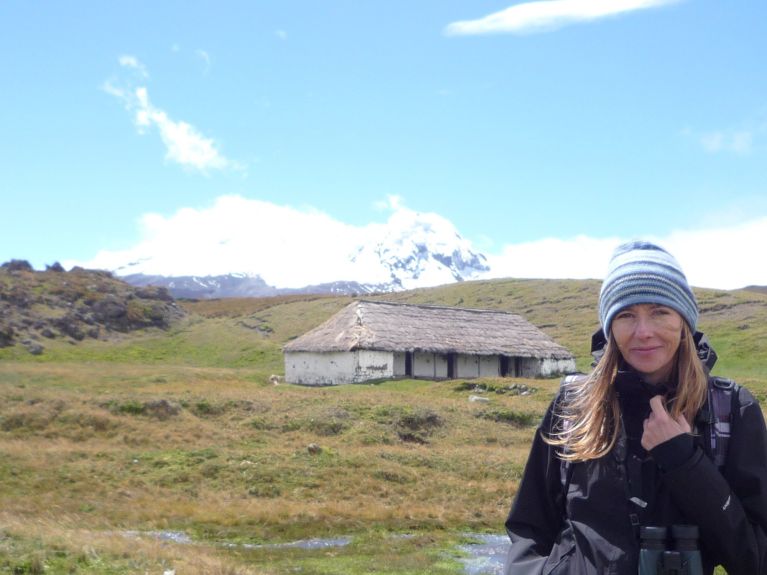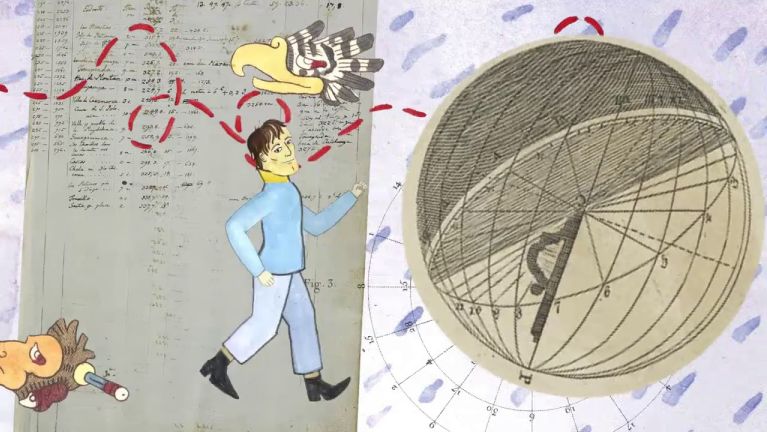“A life like an adventure novel”
Bestselling author Andrea Wulf explains what universal genius Alexander von Humboldt has to do with climate change and sustainability.

Ms Wulf, what fascinates you about Alexander von Humboldt?
His life reads like an adventure novel. Alexander von Humboldt was inquisitive, adventurous, far-sighted and indefatigable – the perfect protagonist for a biography. And if you write about an explorer, you naturally have to travel a lot too – all in the name of research. I’ve never had as much fun writing a book as I had writing the two Humboldt books.

Your second work on Humboldt appears in March. How did that come about?
Humboldt’s diaries were made available to the public just before I completed the biography in 2014. At the very first glance I knew I had to make something of them. It was a very special moment: 4,000 pages strewn with Humboldt’s drawings and sketches. He was an incredibly visual person. Of course, I knew the content, but you can only truly understand his way of thinking if you have held his manuscripts in your hands and read them. My book is a tribute to this unique adventurer and polymath, who so effortlessly combined art and science.
Dieses YouTube-Video kann in einem neuen Tab abgespielt werden
YouTube öffnenThird party content
We use YouTube to embed content that may collect data about your activity. Please review the details and accept the service to see this content.
Open consent formIn the course of your research you travelled in Humboldt’s footsteps through Latin America. What impressed you most?
What was very special was the visit to Chimborazo, where Humboldt developed his revolutionary concept of nature. When he looked down on the world from almost 6,000 metres up it became clear to him that nature is global, a living whole in which everything is interconnected. For him, the trip from Quito to Chimborazo was like a botanical journey from the equator to the poles. He saw how the world’s vegetation zones lay next to one another on the way – from the tropical plants in the valley to the very last small lichen. This moment was so important to him that I also had to see it.
In Latin America Humboldt realised that humankind could destroy nature.
What effect did the Latin American journey have on Alexander von Humboldt?
Humboldt travelled to South America as a scientist, but came back not only as a visionary thinker, but also as an artist. He was so inspired by the surroundings that he did not only explain them like a scientist, but combined poetic landscape descriptions with scientific observations. Humboldt had an incredible memory, which is why he was always able to make comparisons – for example, alpine plants in South America resembled the plants that he had seen in the Swiss Alps or the Pyrenees. Only as a result of this was he able to understand nature as a global force and compare global vegetation and climate zones.
In addition, the journey made him a lifelong opponent of slavery, because he saw how slaves and indigenous peoples were treated by the Spanish colonists. And in Latin America Humboldt realised that humankind could destroy nature. He repeatedly describes this – for example, how pearl fishing on the coast of Venezuela destroyed the oyster banks and how the irrigation systems in Mexico City dried out the surrounding valleys.
Humboldt said we must feel nature in order to understand it.
What can we learn from Alexander von Humboldt in 2019?
An interdisciplinary view: Humboldt addressed a broad range of themes and disciplines in a very comprehensive way and brought art and science together. We tend to draw a clear dividing line between the objective and the subjective. That begins when we tell children they either have a greater gift for mathematics or art. Humboldt was not afraid of describing nature in poetic terms and he said very clearly that we must feel nature in order to understand it. Another lesson is that he saw our earth as an interconnected living whole. That is the only way we can understand the interrelationships involved in climate change and our power to destroy nature.

The way you sketch Humboldt’s life is very poetic, especially in comparison with other German non-fiction books.
Thank you very much! Yes, German academic non-fiction prefers to remain rather dry. My research is also very detailed and academic, and I sit in archives for years, reading only primary sources. But I try nevertheless to put life into the narrative. That’s the big difference between German and English history books. This can also be seen in the terms themselves: “Geschichte”, the German word for history, contains the word “Schicht” or layer, and that is how people examine questions, one layer after the other. The English word “history”, on the other hand, contains the word “story” – and there is after all always a story to be told. I try to bring to life the person I am writing about. But, of course, I do this on the basis of facts, otherwise I would be writing historical novels.
Interview: Sabrina Pfost
Andrea Wulf was born in New Delhi and grew up in Germany. For over twenty years she has lived in London and worked as a journalist and author. She writes for the Wall Street Journal, the New York Times and the Guardian, among other publications, and regularly works for the BBC. Her first book on Humboldt, “The Invention of Nature”, made it onto the New York Times and Spiegel bestseller lists and received numerous awards. Her new book, “The Adventures of Alexander von Humboldt”, is published in Germany on 25 March 2019.
You would like to receive regular information about Germany? Subscribe here:
